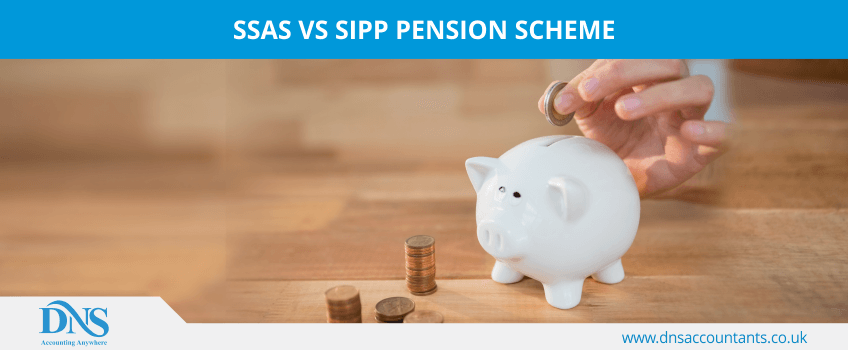Some people say that the SSAS (or a Small Self-Administered Scheme) is not as good as a SIPP (or the Self-Invested Personal Pension). This might have some truth underlying it when you consider the SIPP against another personal pension scheme but not necessarily when you consider the SIPP against the SSAS. This is because the SSAS is an occupational pension scheme: so the question is for whom is the SIPP better and for whom the SSAS?
SSAS and SIPP which suits which investor?

Both SIPP and SSAS are self-invested pension schemes: the SIPP is a personal pension where individuals can make decisions about their investment policy, the SIPP of any individual acts a bit like a sub-trust of the larger master trust. The SIPP holder can move to the occupational SSAS if they want to provide either they are a limited company director, or a member of the family of someone who is already a trustee in an SSAS. Many people are swapping their SIPP for the SSAS to take advantage of certain provisions that are only available through the SSAS and not the SIPP (see Table below).
The SSAS is a company pension scheme, set up as a trust, with an administrator. As it is an occupational pension scheme,it must be set up by an employer for the benefit of company directors and other senior employees; others, such as over-eighteen family members may join the SSAS, but no more than 12 members can belong to any single SSAS scheme.
Despite similarities in investment flexibility and tax regulation between the two types of pensions there are advantages for limited company controlling directors and other senior employers and family members to set up an SSAS. The SIPP, on the other hand, is going to be a great choice for an individual who is not considering an occupational pension of this sort or who is not a company director or related to anyone with an existing SSAS. Besides this obvious distinction, there are a number of other differences between them that are worth considering. The easiest way to show these is in a Table.
| Element of Pension scheme | Self-Invested Personal Pension – SIPP | Small Self-Administered Scheme – SSAS |
|---|---|---|
| Model |
Individual pension scheme: each scheme member makes their own arrangements as a sub-trust under one master trust. The SIPP’s status – as a sub-part of a larger master trust can mean it is less flexible than SSAS, which is a trust controlled by its members. |
Occupational pension, self-administered by a trust made up from members of a company and other affiliated people. It’s a stand-alone scheme, which means it has more flexibility than a SIPP. |
| Members |
Some individuals are trustees of their own SIPP, but most SIPPs have a “professional” trustee/administrator (which comes with admin fees); some SIPPS join together (e.g. to buy commercial property). But there is less control, in the SIPP model – an individual (sub-trust) within the larger SIPP master trust. The member’s employer can contribute to the SIPP and make deduction via payroll for the member. |
In the SSAS all members of the scheme are trustees, and all decisions in relation to the SSAS trust must be unanimously agreed. Not only does this structure offer good security but so long as all members agree, then the trust has full control over investments.
Each member has a notional share of the funds in the SSAS, including property owned by the trust and money held in the trust’s investment plan. The fact that none of the assets or funds are earmarked can have tax advantages for members of the trust. Third-party SSAS members (e.g. family members can contribute to the fund). The fees for operating the SSAS are an allowable expense against corporation tax and VAT can be reclaimed. Advice: It is highly recommended that the scheme hires a “professional” administrator unless one of the trustees happens to be expert in the UK tax system. |
| Loan facility |
If a SIPP makes a loan to a “connected party” (e.g. a spouse or relative, or a trustee) it will incur a tax charge. Otherwise both SIPP and SSAS can make loans to third parties, but the rules are strict, and the SIPP master-trust may not agree to it. As the SIPP is not an occupational pension it cannot take advantage of the sponsoring employer” investment opportunity. See more about the rules relating to loans via a SIPP here. |
The same rule applies regards the rule of a “connected party”, but with the SSAS the employer is connected if the scheme member and connected parties have control over it. The SSAS’s “sponsoring employer” loan facility is its BIG PLUS. The SSAS can loan the “sponsoring employer” (e.g. the company that runs the trust) up to 50% of the funds held by the trust at nominal interest. The loan must directly benefit the business, meaning it can be used to help fund buying new plant or equipment or for purchasing and/or developing the business premises. Warning: there could be a tax charge if the transaction isn’t properly administrated. |
| Approved |
A Self-Invested Personal Pension, or SIPP, is a UK government-approved scheme and therefore allows individuals to make their own investment decisions from the full range of investments approved by HMRC |
The SSAS administrator must enrol the scheme with HMRC before registering the SSAS with the Pensions regulator. SSAS funds must be paid into a scheme bank account. The trust fund is ring-fenced from the company and is fully protected from other SSAS members and creditors or scams. |
| Security | The FCA regulates SIPPs and also to lesser extent the Pensions Regulator. | The Pensions regulator regulates SSAS if the scheme is registered. |
| Tax advantages |
SIPPs offer up to 45% tax relief on contributions and there is no UK Capital Gains Tax (CGT) or Income Tax to pay. The tax benefits will depend on individual circumstances and the tax rules relating to SIPPs are subject to change by the government. |
The SSAS attracts similar tax advantages as a SIPP with one BIG added advantage of some great tax-planning strategies attached to it, such as using it as a family trust through which to pass on property and liquid assets. Further, the trust can grow by charging the company rent if it owns the business premises. This means that the SSAS grows to the benefit of the trustees, but also that the business – the “sponsoring employer” – reduces the company’s corporation tax liability at the same time. |
| Investments |
Each member holds specific investments or shares, but individuals are not fully in charge of where they can make investments as the master trust covers every member. |
The SSAS can invest up to 5% of the scheme assets in shares of any sponsoring employer. Shares in “sponsoring companies” can be bought up to 20% of the SSAS fund. The SSAS has a similar investment flexibility to a SIPP, but normally provides better value in terms of administrative costs. SSAS investments are held for all members jointly. As members can invite children to join the SSAS this is one way to pass on assets through the generations. |
| Losses | Covered by the Financial Services Compensation Scheme. |
No compensation body, but the rules governing the set-up, administration and restrictions of SSAS are quite stringent and this makes them quite secure. |
| Costs |
The SIPP attracts several costs: first if four people were going to purchase a commercial building among for SIPPS, then there would be four SIPP registration fees and then four sets of legal bills for the purchase. |
In the same circumstances if the SSAS wants to purchase commercial property, it attracts one set of legal costs. And to set it up there is only one registration fee. The SSAS should be administrated by a “Professional “Administrator”, a professional trustee or an Accountant with expert knowledge of the UK tax system, is essential. |
Take some advice today
Make up your own mind, but don’t think in terms only of which is better, the SSAS or the SIPP, because they are different creatures really; both have great tax benefits and both offer a certain flexibility where members have control over their investments. However, an individual cannot set up SSAS as it is an occupational pension scheme, but any company director should consider very carefully the SSAS option as a great way to invest, grow the business, and pass on assets to children through the SSAS trust.
For company directors with SIPPs it is worthwhile considering the option of transferring a SIPP to the SSAS model, or just starting an SSAS to take advantage of the loan and investment opportunities it can offer your business.
The SSAS requires quite a degree of admin and a good knowledge of UK tax law. Therefore it is highly advisable to hire a Professional Administrator to advise, ensure the SSAS is making the most of all of its tax advantages and that it is compliantly run.
Also See: Complete guide on Directors Loans Accounts
Any questions? Schedule a call with one of our experts.

.png)






